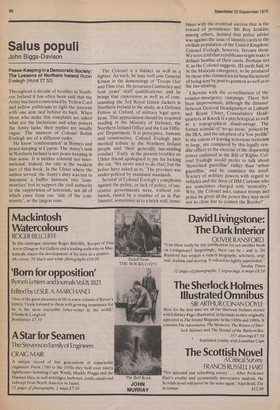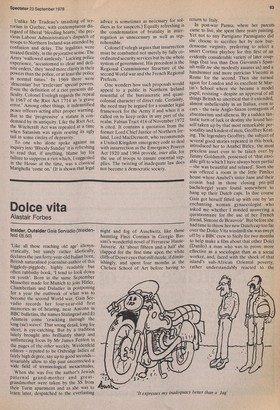Salus populi
John Biggs-Davison
Peace-Keeping in a Democratic Society: The Lessons of Northern Ireland Robin Evelegh (Hurst £7.50) Throughout a decade of troubles in Northern Ireland it has often been said that the Army has been constrained by Yellow Card and yellow politicians to fight the terrorist with one arm tied behind its back. When those who make this complaint are asked what are the limitations and what powers the Army lacks, their replies are usually vague. The answers of Colonel Robin Evelegh are of a different order.
He knew 'confrontation' in Borneo and peace-keeping in Cyprus. The Army's task in Northern Ireland is not peace-keeping in that sense. It is neither colonial nor international. Indeed, the title is the weakest part of this book. In the Ulster where the author served, the Army's duty was not to interpose a buffer between two 'communities' but to support the civil authority in the suppression of terrorism, not all of which came from one 'side of the community', as the jargon runs. The Colonel is a thinker as well as a fighter. As such, he may well join General Kitson in the demonology of 'Troops Out' and Time Out. He possesses Camberley and four years' staff qualifications; and he brings that experience as well as of commanding the 3rd Royal Green Jackets in Northern Ireland to the study, as a Defence Fellow at Oxford, of military legal questions. This appreciation should be required reading in the Ministry of Defence, the Northern Ireland Office and the Law Officers' Department. It is perceptive, humane and constructive. Colonel Evelegh pays merited tribute to the Northern Ireland people and 'their generally law-abiding conduct.' Early in the present troubles an Ulster friend apologised tone for locking the car. 'We never used to do that; but the police have asked us to.' The province was under-policed by mainland standards.
Several of Colonel Evelegh's complaints against the policy, or lack of policy, of successive governments were, without collusion, raised by a number of us in Parliament, sometimes as to a brick wall, some times with the eventual success that is the reward of persistence. Mr Roy Jenkins, among others, insisted that police advice was against the issue of identity cards to the civilian population of the United Kingdom. Colonel Evelegh, however, favours them. We were told that republicans might make a defiant bonfire of their cards. Perhaps not if, as the Colonel suggests, ID cards had, as in the Malayan emergency, to be produced by those who claimed social benefits instead of being sent by post to gunmen as well as to the law-abiding.
Likewise with the co-ordination of the counter-insurgency campaign. There has been improvement, although the distance between General Headquarters at Lisburn and Royal Ulster, Constabulary Headquarters at Knock is a psychological as well as a topographical disadvantage. The former scandal of `no-go areas,' policed by the IRA, and the adoption of a 'low profile' to the extent of leaving notorious terrorists at large, are compared by this legally erudite officer to the exercise of the dispensing power outlawed in the Bill of Rights. Colonel Evelegh would prefer to talk about `rhotorised guerrillas' rather than 'urban guerrillas,' and he examines the insufficiency of military powers with regard to vehicles and the farce of HM Customs who are sometimes charged with 'neutrality.' Why, the Colonel asks, cannot troops and police be given all the power they may need not to close but to control the Border? Unlike Mr Trudeau's smashing of terrorism in Quebec, with contemptuous disregard of liberal 'bleeding hearts,' the previous Labour Administration's dispatch of troops to Northern Ireland was attended by confusion and delay. The legalities were treated flexibly, in the pejorative sense. The Army 'wallowed aimlessly.' Lacking police experience, 'accustomed to clear and definite orders,' they 'need more clarity in their Powers than the police, or at least the police In normal times.' In 1969 there were 'draconian' but 'irrelevant' special powers. Even the definition of a riot presents difficulty. Colonel Evelegh regards the repeal in 1967 of the Riot Act 1714 as 'a grave error.' Among other things, it indemnified peace officers acting after proper warning. But to the 'progressive' a statute is condernned by its antiquity. Like the Riot Act, the Witchcraft Act was repealed at a time when Satanism was again rearing its ugly tail in some circles of depravity. To one who alone spoke against .an inquiry into 'Bloody Sunday' it is refreshing to read that, if anything, blame lay kir failure to suppress a riot which, I suggested in the House at the time, was a classical Marighella 'come on.' (It is shown that legal advice is sometimes as necessary for soldiers as for suspects.) Equally refreshing is the condemnation of brutality in interrogation as unnecessary as well as reprehensible.
Colonel Evelegh argues that insurrection must be combatted not merely by fully coordinated security services but by the whole system of government. His precedent is the Regional Commissioner Structure of the second World war and the French Regional Prefects.
One wonders how such proposals would appeal to a public in Northern Ireland resentful of the bureaucratic and quasicolonial character of direct rule. Certainly, the need may be argued for a sounder legal framework for the Army if and when it is called on to keep order in any part of the realm. Fabian Tract 416 of November 1972 is cited. It contains a quotation from the former Lord Chief Justice of Northern Ireland, Lord MacDermott, who recommends a United Kingdom emergency code to deal with insurrection as the Emergency Powers Act 1920 and 1964 provide, inter alia, for the use of troops to ensure essential supplies. The twisting of inadequate law does not become a democratic society.



































































































 Previous page
Previous page